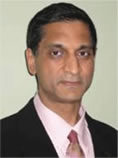



Important Dates
Workshop held on 11th June 2012
|
 |
 |
Dr. Ayman Radwan Dr. Hossam S. Hassanein Dr. Jonathan Rodriguez |
We are pleased to announce that Dr. Suresh Goyal - Head of Green Research, Bell Labs will give an invited talk at the Greenetworking Workshop.
|
 |
The mobile phone of tomorrow will be more sophisticated in nature, tending towards a personal area space that can support mobile internet resulting in power hungry devices. If we are to maintain market sustainability, then there is a clear need for prolonged battery lifetime: the word mobile is taken as de facto, in that users have the freedom to roam around and be connected to the best available technology at any time; however, if preventive measures are not taken to conserve energy, then users could be restricted to the nearest power supply falling victim to the so called “Energy Trap”.
On one hand, operators see a potential benefit from investing in energy compliant systems since 98% of the energy consumption is on the network side, meaning that huge savings can be foreseen in the operators’ electricity bill. On the other hand, instead of preventing energy loss, energy can be perceived as a tradable commodity leading to new potential sources of revenue for end users and operators since everyone can relate to instances when they need to make that important call and the battery logo is flashing whilst on the move ...
Key technologies for energy conservation and management include cognitive and cooperative strategies, which are seen as disruptive in nature:
-
Cooperative strategies can be applied on several layers, ranging from radio relaying to social networking; and clearly they dictate how a group of entities can interact and assist each other to achieve a common goal.
- Cognitive radio is a traditional subject that has been applied to spectrum management, whereas here we refer to the way we can make systems more intelligent based on sensing, and reacting to the surrounding environment.
The joint application of these two technologies has led towards new paradigms in network design and deployment for energy saving, providing a stepping stone towards economic and environmental sustainability for the future.
This workshop intends to bring together academic and industrial researchers to identify and discuss technical challenges and recent results related to energy efficiency from user devices through to the core infrastructure of the network and how these devices and equipment interact among each other.
 |
 |
|






